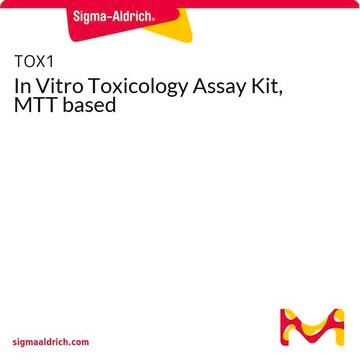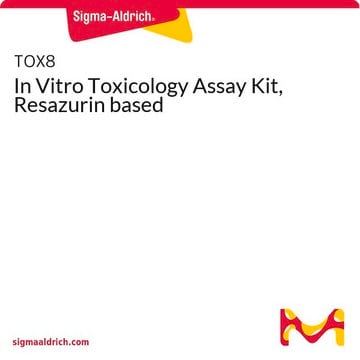CGD1
Cell Growth Determination Kit, MTT based
Synonym(s):
Mitochondrial activity assay
Sign Into View Organizational & Contract Pricing
All Photos(1)
About This Item
UNSPSC Code:
12352207
NACRES:
NA.75
Recommended Products
packaging
pkg of 1 kit
technique(s)
UV/Vis spectroscopy: suitable
protein quantification: suitable
Amax
570 nm
application(s)
cell analysis
detection
detection method
colorimetric
shipped in
dry ice
storage temp.
−20°C
Related Categories
General description
Cell Growth Determination Kit (MTT based) is designed for the spectrophotometric measurement of cell growth as a function of mitochondrial activity in living cells. The MTT (3-(4, 5-dimethylthiazolyl-2)-2, 5-diphenyltetrazolium bromide) system is a simple, accurate, reproducible means of measuring the activity of living cells via mitochondrial dehydrogenase activity.
Application
Cell Growth Determination Kit, MTT based has been used:
- to measure the cell viability of preosteoblastic cells
- in MTT (3-(4, 5-dimethylthiazolyl-2)-2, 5-diphenyltetrazolium bromide) assay of normal human prostatic stromal and epithelial cell lines
- to determine the cell viability of primary cervical epithelial cells
Packaging
Each kit includes 5 vials each containing 1 mL of 5 mg/ml MTT in RPMI (without phenol red) and 50 mL of MTT solvent (0.1 N HCl in anhydrous isopropanol). Volumes of kit components have been optimized for cultures grown in multi-well plates. MTT solutions is added at 10% of total culture volume, thus the number of tests per kit is dependent upon culture vessel and/or volume.
related product
Product No.
Description
Pricing
Signal Word
Danger
Hazard Statements
Precautionary Statements
Hazard Classifications
Eye Irrit. 2 - Flam. Liq. 2 - Muta. 2 - STOT SE 3
Target Organs
Central nervous system
Storage Class Code
3 - Flammable liquids
Flash Point(F)
53.6 °F - closed cup
Flash Point(C)
12 °C - closed cup
Certificates of Analysis (COA)
Search for Certificates of Analysis (COA) by entering the products Lot/Batch Number. Lot and Batch Numbers can be found on a product’s label following the words ‘Lot’ or ‘Batch’.
Already Own This Product?
Find documentation for the products that you have recently purchased in the Document Library.
Customers Also Viewed
Carla M R Lacerda et al.
American journal of physiology. Heart and circulatory physiology, 302(10), H1983-H1990 (2012-02-22)
This study addressed the following questions: 1) Does cyclic tensile strain induce protein expression patterns consistent with myxomatous degeneration in mitral valves? 2) Does cyclic strain induce local serotonin synthesis in mitral valves? 3) Are cyclic strain-induced myxomatous protein expression
Qiuyu Lin et al.
Journal of cellular and molecular medicine, 22(10), 4640-4652 (2018-07-25)
This study is aimed to investigate the methylation level of candidate genes and its impact on thyroid carcinoma (THCA) development. Infinium Human Methylation 450 BeadChip Arrays by Illumina (Illumina HM450K) was the most popular CpG microarray platform widely used in
Mengxiong Wang et al.
Oncogene, 38(22), 4264-4282 (2019-02-06)
While HER2 and EGFR are overexpressed in breast cancers and multiple other types of tumors, the use of EGFR and/or HER2 inhibitors have failed to cure many cancer patients, largely because cancers acquire resistance to HER2/EGFR-specific drugs. Cancers that overexpress
Ahran Pae et al.
The journal of advanced prosthodontics, 6(2), 96-102 (2014-05-21)
This study was performed to characterize the effects of zirconia coated with calcium phosphate and hydroxyapatite compared to smooth zirconia after bone marrow-derived osteoblast culture. Bone marrow-derived osteoblasts were cultured on (1) smooth zirconia, (2) zirconia coated with calcium phosphate
Shang-Long Liu et al.
Oncology letters, 17(2), 2057-2062 (2019-01-25)
The biological features of pancreatic cancer and the associated hypoxic environment around the cancer cells often lead to resistance to radiotherapy and chemotherapy. The present study was performed in order to explore the effect pancreatic stellate cells (PSCs) have on
Our team of scientists has experience in all areas of research including Life Science, Material Science, Chemical Synthesis, Chromatography, Analytical and many others.
Contact Technical Service













